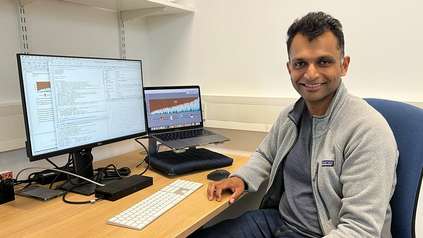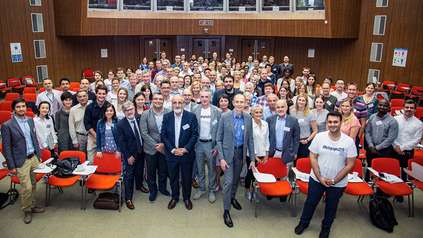Childhood exposure to bacterial toxin may be triggering colorectal cancer epidemic among the young
Listen to this article:
Listen to “Childhood exposure to bacterial toxin may be triggering colorectal cancer epidemic among the young” on Spreaker.
Exposure to colibactin, a toxin produced by certain strains of the bacterium, Escherichia coli, in early childhood may increase the risk of developing colorectal cancer before the age of 50, new research suggests.
Researchers from the Wellcome Sanger Institute, University of California San Diego and their collaborators analysed 981 colorectal cancer genomes from patients with both early- and late-onset cancer across 11 countries with varying colorectal cancer risk levels.
The new study, published today (23 April) in Nature, reports that exposure to colibactin in early childhood imprints a distinct pattern of change, known as the “mutational signature”, on the DNA of colon cells — one that may increase the risk of developing colorectal cancer before the age of 50.
Despite overall colorectal cancer cases decreasing, this particular cancer is on the rise amongst young people in at least 27 countries.1 If current trends continue, colorectal cancer is projected to become the leading cause of cancer-related deaths among young adults globally by 2030.
Until now, the reasons behind this surge have remained unknown. Young adults diagnosed with colorectal cancer often have no family history of the disease and few known risk factors such as obesity or hypertension. This has fueled speculation about potential hidden environmental or microbial exposures that are contributing to cases, especially in young adults.
This current study originally sought to understand the variation of colorectal cancer incidences between countries by sequencing colorectal cancer genomes from 11 countries on four continents to understand how changes in DNA contribute to geographic and age-related differences in cancer rates.2 However, when analysing the data, the researchers revealed interesting findings about the early-onset cases in particular.
The findings show that colibactin, a toxin produced by E. coli, leaves behind specific patterns of DNA mutations that were 3.3 times more common in early-onset cases – specifically in adults under 40 – than in those diagnosed after the age of 70. These mutation patterns were also particularly prevalent in countries with high incidence of early-onset cases.
In the new study, the team also found that colorectal cancers from specific countries — particularly Argentina, Brazil, Colombia, Russia and Thailand — showed an increase in certain mutational signatures. This suggests that local environmental exposures may also contribute to cancer risk.
According to the team’s analysis, colibactin’s damaging effects begin early. By molecularly timing each mutational signature identified in this study, the researchers demonstrate that colibactin-associated mutations arise early in tumour development, consistent with prior studies showing that such mutations occur within the first 10 years of life.
The researchers suggest that colibactin-producing bacteria may be silently colonising children’s colons, initiating molecular changes in their DNA, and potentially setting the stage for colorectal cancer.
Whilst it is well known that certain diet and lifestyle choices increase the risk of colorectal cancer, this study further expands the global understanding of cancer causes through analysis of DNA signatures.
It is suggested that many cancers may originate from environmental or microbial exposures in early life, so this research will change the way we think about cancer and what happens in the first decade of life.
For future studies, this research will allow the team to investigate several hypotheses to examine the correlation between colibactin and the risk of early-onset colorectal cancer more closely. This also opens up the potential for targeted prevention strategies such as tests that detect the presence of the toxin or the bacterium that produces the toxin.
“When we started this project, we weren’t planning to focus on early-onset colorectal cancer. Our original goal was to examine global patterns of colorectal cancer to understand why some countries have much higher rates than others. But as we dug into the data, one of the most interesting and striking findings was how frequently colibactin-related mutations appeared in the early-onset cases.”
Dr Marcos Díaz-Gay, co-first author and Junior Group Leader at the Spanish National Cancer Research Centre
“These mutation patterns are a kind of historical record in the genome, and they point to early-life exposure to colibactin as a driving force behind early-onset disease. Not every environmental factor or behaviour we study leaves a mark on our genome. But we’ve found that colibactin is one of those that can. In this case, its genetic imprint appears to be strongly associated with colorectal cancers in young adults.”
Professor Ludmil Alexandrov, senior author of the study, professor in the Shu Chien-Gene Lay Department of Bioengineering and the Department of Cellular and Molecular Medicine at University of California San Diego
“Our research has allowed us to generate the hypothesis that the presence of colibactin leads to an increased number of mutations in colon cells, which then causes a greater risk of colorectal cancer at an early age. If this turns out to be correct, we can explore preventive measures such as tests that tell us if the toxin, or the bacterium that makes it, is present and find ways to eliminate them from our bodies at a young age. We know that diet and lifestyle choices drive the risk of developing colorectal cancer, but this study has opened up a new and exciting route we can take when researching how to lower the rate of early-onset colorectal cancer.”
Professor Sir Mike Stratton, Mutographs team lead and Senior Group Leader at the Wellcome Sanger Institute
More information
Notes to Editors
- Cancer Research UK. Bowel cancer rates rising in younger adults around the world. 2024. Available at: https://news.cancerresearchuk.org/2024/12/11/early-onset-bowel-cancer-rise-global-phenomenon/ [Last accessed: April 2025]
- The work is part of the Mutographs of Cancer – Cancer Research UK Grand Challenge Project: https://www.cancergrandchallenges.org/. As part of a long-term collaboration between the Sanger Institute, University of California San Diego (US) and the International Agency for Research on Cancer (France), the Mutographs project has uncovered the mutational processes underlying oesophageal, kidney, and head and neck cancers worldwide.
Publication
Díaz-Gay, M. et al. (2025) Geographic and age variations in mutational processes in colorectal cancer. Nature. DOI: 10.1038/s41586-025-09025-8
Funding
This research was funded by Cancer Research UK as part of the Cancer Research UK Grand Challenge. A full list of funding acknowledgments can be found in the publication.




